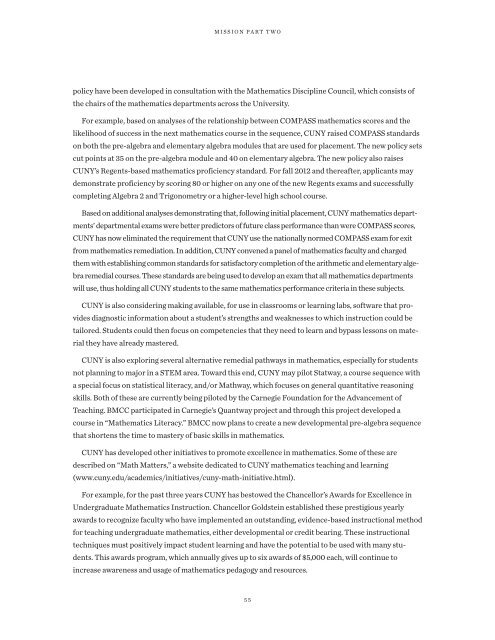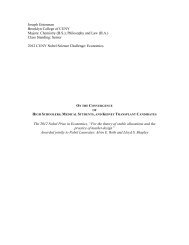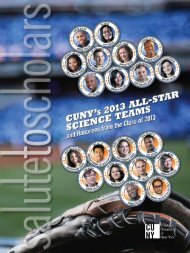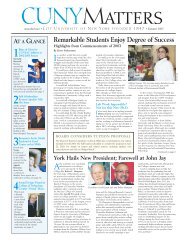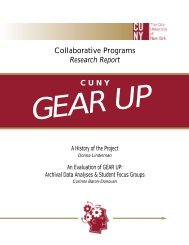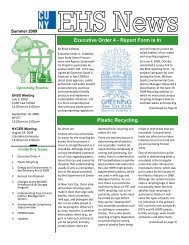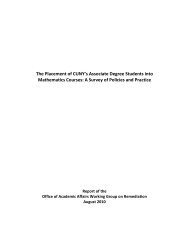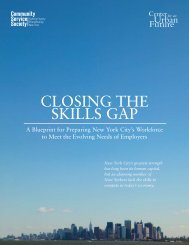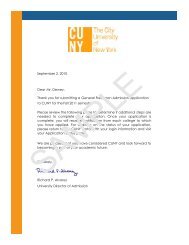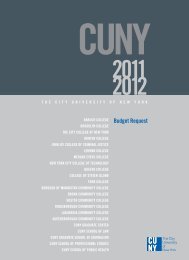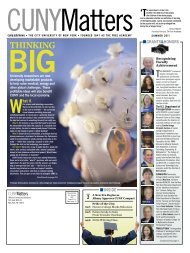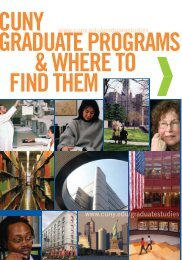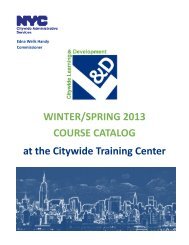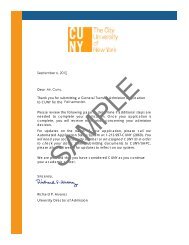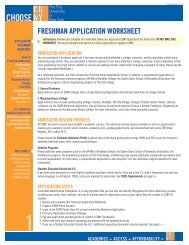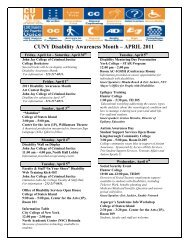CUNY Master Plan 2012-2016
CUNY Master Plan 2012-2016
CUNY Master Plan 2012-2016
You also want an ePaper? Increase the reach of your titles
YUMPU automatically turns print PDFs into web optimized ePapers that Google loves.
MISSION PART TWO<br />
policy have been developed in consultation with the Mathematics Discipline Council, which consists of<br />
the chairs of the mathematics departments across the University.<br />
For example, based on analyses of the relationship between COMPASS mathematics scores and the<br />
likelihood of success in the next mathematics course in the sequence, <strong>CUNY</strong> raised COMPASS standards<br />
on both the pre-algebra and elementary algebra modules that are used for placement. The new policy sets<br />
cut points at 35 on the pre-algebra module and 40 on elementary algebra. The new policy also raises<br />
<strong>CUNY</strong>’s Regents-based mathematics proficiency standard. For fall <strong>2012</strong> and thereafter, applicants may<br />
demonstrate proficiency by scoring 80 or higher on any one of the new Regents exams and successfully<br />
completing Algebra 2 and Trigonometry or a higher-level high school course.<br />
Based on additional analyses demonstrating that, following initial placement, <strong>CUNY</strong> mathematics departments’<br />
departmental exams were better predictors of future class performance than were COMPASS scores,<br />
<strong>CUNY</strong> has now eliminated the requirement that <strong>CUNY</strong> use the nationally normed COMPASS exam for exit<br />
from mathematics remediation. In addition, <strong>CUNY</strong> convened a panel of mathematics faculty and charged<br />
them with establishing common standards for satisfactory completion of the arithmetic and elementary algebra<br />
remedial courses. These standards are being used to develop an exam that all mathematics departments<br />
will use, thus holding all <strong>CUNY</strong> students to the same mathematics performance criteria in these subjects.<br />
<strong>CUNY</strong> is also considering making available, for use in classrooms or learning labs, software that provides<br />
diagnostic information about a student’s strengths and weaknesses to which instruction could be<br />
tailored. Students could then focus on competencies that they need to learn and bypass lessons on material<br />
they have already mastered.<br />
<strong>CUNY</strong> is also exploring several alternative remedial pathways in mathematics, especially for students<br />
not planning to major in a STEM area. Toward this end, <strong>CUNY</strong> may pilot Statway, a course sequence with<br />
a special focus on statistical literacy, and/or Mathway, which focuses on general quantitative reasoning<br />
skills. Both of these are currently being piloted by the Carnegie Foundation for the Advancement of<br />
Teaching. BMCC participated in Carnegie’s Quantway project and through this project developed a<br />
course in “Mathematics Literacy.” BMCC now plans to create a new developmental pre-algebra sequence<br />
that shortens the time to mastery of basic skills in mathematics.<br />
<strong>CUNY</strong> has developed other initiatives to promote excellence in mathematics. Some of these are<br />
described on “Math Matters,” a website dedicated to <strong>CUNY</strong> mathematics teaching and learning<br />
(www.cuny.edu/academics/initiatives/cuny-math-initiative.html).<br />
For example, for the past three years <strong>CUNY</strong> has bestowed the Chancellor’s Awards for Excellence in<br />
Undergraduate Mathematics Instruction. Chancellor Goldstein established these prestigious yearly<br />
awards to recognize faculty who have implemented an outstanding, evidence-based instructional method<br />
for teaching undergraduate mathematics, either developmental or credit bearing. These instructional<br />
techniques must positively impact student learning and have the potential to be used with many students.<br />
This awards program, which annually gives up to six awards of $5,000 each, will continue to<br />
increase awareness and usage of mathematics pedagogy and resources.<br />
55


